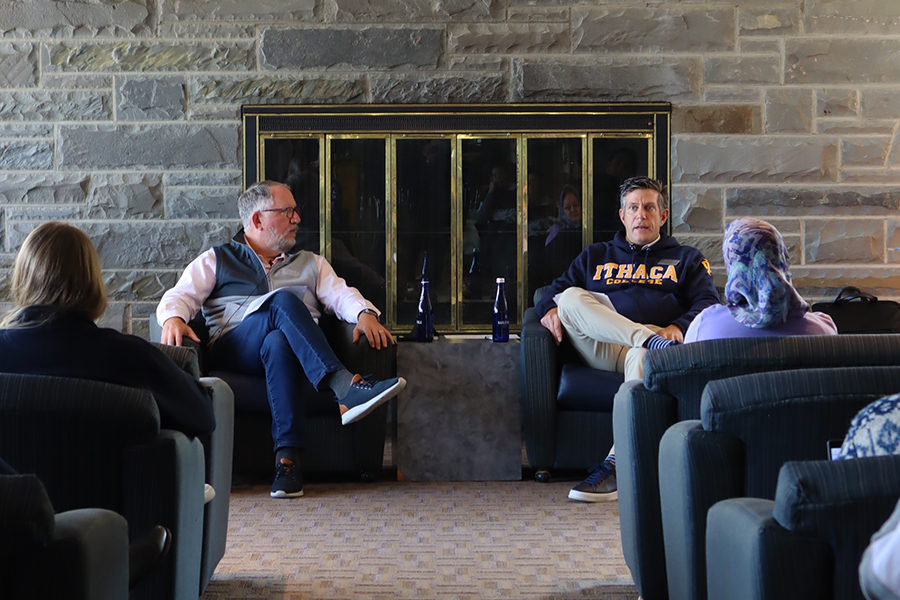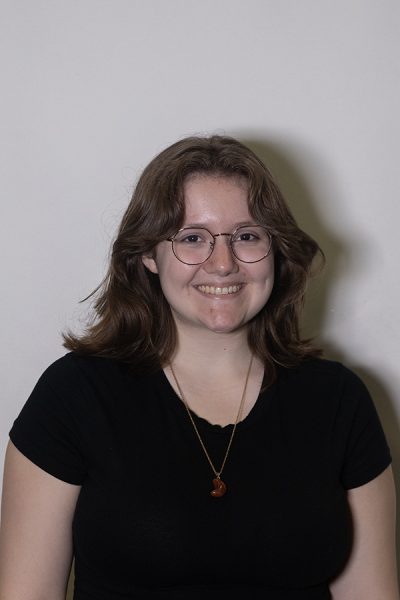The Ithaca College Board of Trustees held an open meeting Oct. 11 to give an overview of its fall meetings and answer questions from the 18 attendees that gathered in the Clark Lounge. The trustees spoke about generative AI and the college’s decreasing enrollment.
The board of trustees held its Fall 2024 meetings on campus from Oct. 9–11. John Neeson ’84, chair of the board of trustees, and Christopher Palmieri ’96, vice chair of the board of trustees, started off the open meeting by recapping important highlights.
Neeson said there were two new members elected to the board of trustees: Jerry Dietz ’75, who serves on the Audit, Building and Grounds Committee, and Kimberly Allen ’96, who serves on the Finance and Investment Committee and the Marketing and Enrollment Strategy Committee.
The board of trustees elected three new campus trustees, who work or live on campus while being board members: Sarah Haefeli, associate professor in the Department of Music Theory, History, and Composition, who will serve on the Academic Affairs and Student Experience Committee and the Philanthropy and Engagement Committee; Scott Doyle ’98, director of energy management and sustainability, who will serve on the Building and Grounds Committee and the Finance and Investment Committee; and junior Mureen Doherty, television and digital media major, who will serve on the Academic Affairs and Student Experience Committee and Marketing and Enrollment Strategy Committee.
Neeson, an adjunct professor at Boston College, said the board of trustees also discussed the lingering effects of the COVID-19 pandemic on the Class of 2028, who were entering high school when the pandemic began.
“I certainly see [students who need help] in my own teaching,” Neeson said. “I look at students to see those two or three years had some challenges and growth and resocialization.”
Kimberly Lieb, business partner in the Office of Human Resources, attended the meeting and asked if there is anything staff and faculty can do differently to help the college stay relevant during a time when enrollment is decreasing.
Neeson said the board of trustees’ main focus right now is looking into ways to attract students and make their experience at the college special in order to increase both student enrollment and retention.
“We have 27 varsity teams,” Neeson said. “We’ve got a number of different clubs, a variety of ways for students to get involved. We’ll continue to look at innovative ways in which to make that [student] experience unique.”
Jonathan Ablard, professor and Latin American studies coordinator in the Department of History, asked why the college saw a decline in enrollment last year when other institutions in the area did not see that same drop.
Neeson said there were different aspects of the enrollment process that contributed to the college’s decline in enrollment, including the Free Application for Federal Student Aid, which had several updates for the 2024–25 academic year like expanded access to Federal Pell Grants and a new definition of family in FAFSA formulas. He said President La Jerne Cornish will speak more about these aspects at the Fall 2024 State of the College meeting Oct. 22.
“[We] look at that and say, ‘Ok, well, we still have a great product,’” Neeson said. “We’ve got a good student base … so we feel good about that. I think as we look going forward, we’ll always look at what is the right size for the institution. The board will always ask those questions of the President, and the President will always look … at the different areas of the college that we need to improve upon.”
Palmieri said that while the board of trustees is not here to solve the problems, it is addressing them by looking at the college’s financial trends and determining what problems can be taken care of for a lower cost.
“I think it goes without saying … that we need to probably make some enhancements in the campus,” Palmieri said. “And whether that’s big cranes coming or just improving lighting and carpeting, there [are] some things that we can do that may be less capital outlay.”
Narges Kasiri, professor in the Department of Management, asked if the board of trustees had discussed how different types of AI can change teaching and learning in the classroom and if there will be any changes to how faculty should approach AI moving forward.
Neeson said it is still up to professors to decide how they want AI to be used in their individual classrooms, but the board has been discussing how to support professors who want to begin integrating it into their classrooms.
“I couldn’t tell you the future of where exactly the schools [are going] with it just yet, but it’s on my mind because I do think that it’s important that we have it as a tool to use, because … your students are going to use it in real life,” Neeson said. “So we have to prepare them for it, and I’d rather see us be a leader than a lagger.”















